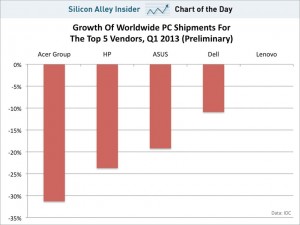So Google has decided that Evernote needs to destroyed. That’s not what the search giant says, of course, but that’s the clear intention. The company has launched Keep as a web service and an Android app. This video confirms that Evernote is the target, because it could have been made about the older service.
I’m reminded of the way Apple launched iCloud as a way of dealing with Dropbox. That doesn’t seem to have worked. I’m still using Dropbox and avoiding iCloud. I expect I’ll continue to use Evernote, for two reasons. Firstly it’s built into my daily workflow. And secondly, if I pay for a service I have some level of confidence in its continuity.
No such certainty attends reliance on any of Google’s services. Charles Arthur has a terrific piece in the Guardian, “Google Keep? It’ll probably be with us until March 2017 – on average”, based on an analysis of 39 services that Google has shut down. Here’s what he found:
According to data I’ve gathered on 39 Google services and APIs – ranging from the short-lived “Google Lively” (a 3D animated chat introduced on 9 July 2008 and euthanised just 175 days later, on 31 December) to the surprisingly long-lived iGoogle (a personalised Google homepage, to which you could add RSS feeds and data, introduced in May 2005 and due for the chop in November after 3.106 days) – the average lifespan of products that don’t make the cut is 1,459 days. That’s just two days short of four years. For those keen on statistics, the standard deviation is 689 days; bar one item (iGoogle) all the group members lie within two standard deviations of the mean.
There are various ways of looking at this. One can, for example, applaud Google’s creativity — the way its engineers spew out innovative, experimental services as “perpetual betas”; it shows the kind of cognitive surplus that the company generates. Good for them!
On the other hand, one can take the view that as a dominant company on the Internet, Google has acquired special responsibilities: it’s become like a public utility and therefore should not behave like a cheeky, innovative start-up. Thousands and thousands of serious Internet users (including yours truly) built their work-flows round Google Reader; and Google’s entry into the RSS-aggregator market effectively ended the lives of earlier, smaller products. (I remember a time when the most chilling question a start-up could face from a potential investor was: “What will you do if Google decides to enter your target market?”)
Now, having wiped out those small fry, Google exits with a blithe statement saying that it needs to focus on core business.
I have a hunch that Google will come to regret this particular decision. Apart from anything else, Reader drove a lot of traffic — far more, I suspect, than Google+ does.
On the basis of his statistical analysis, Charles Arthur thinks that we can expect Keep to be around only until 18 March 2017.

